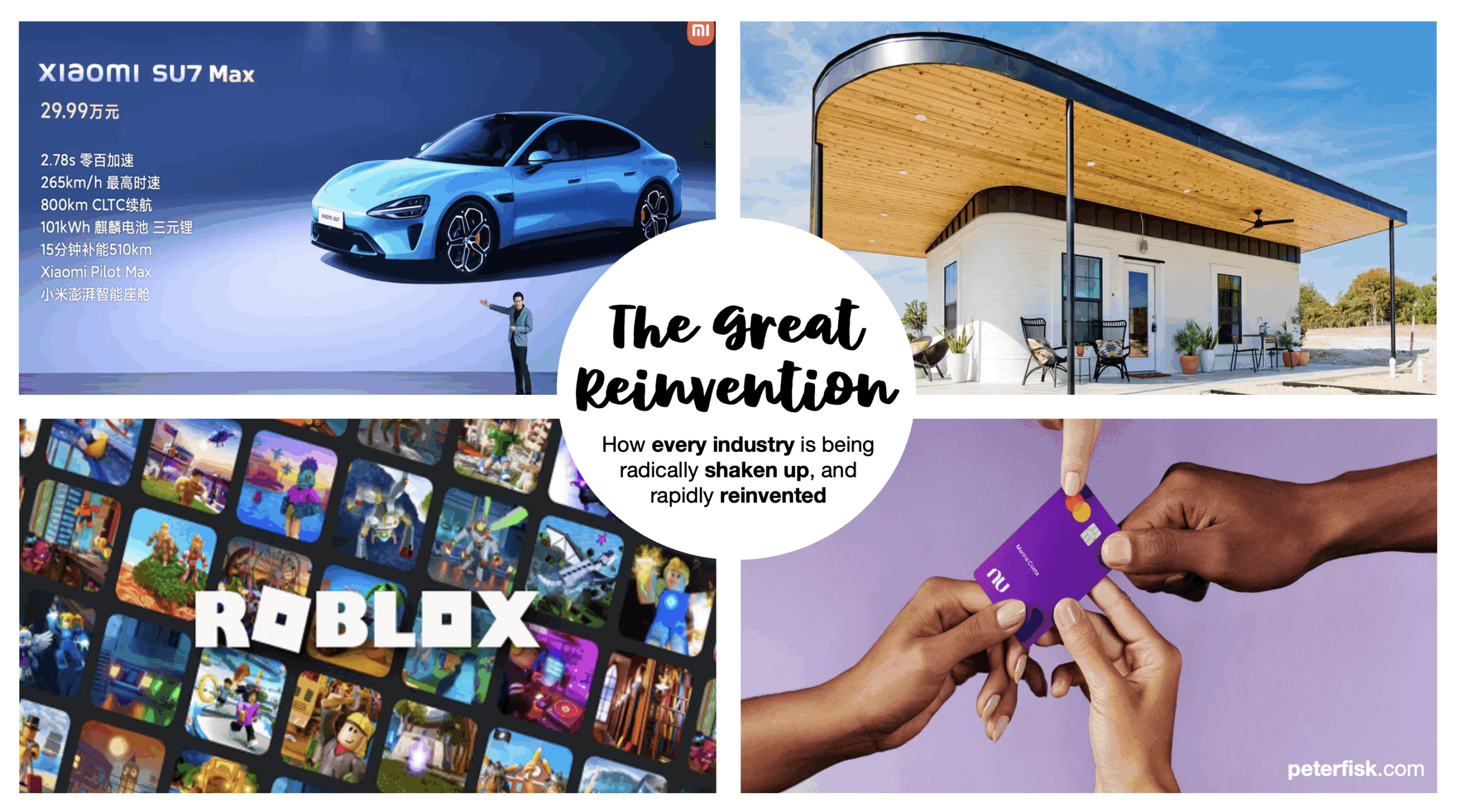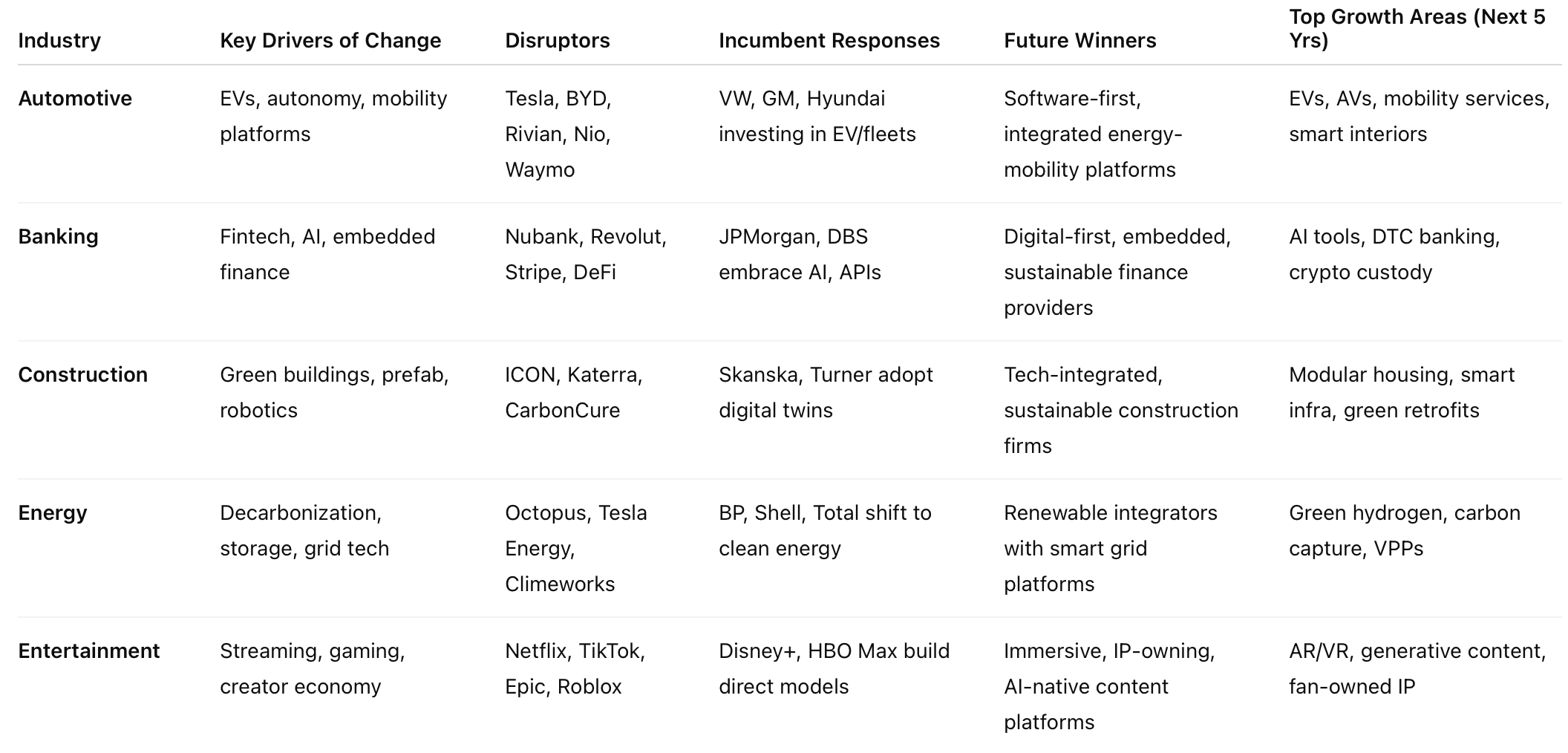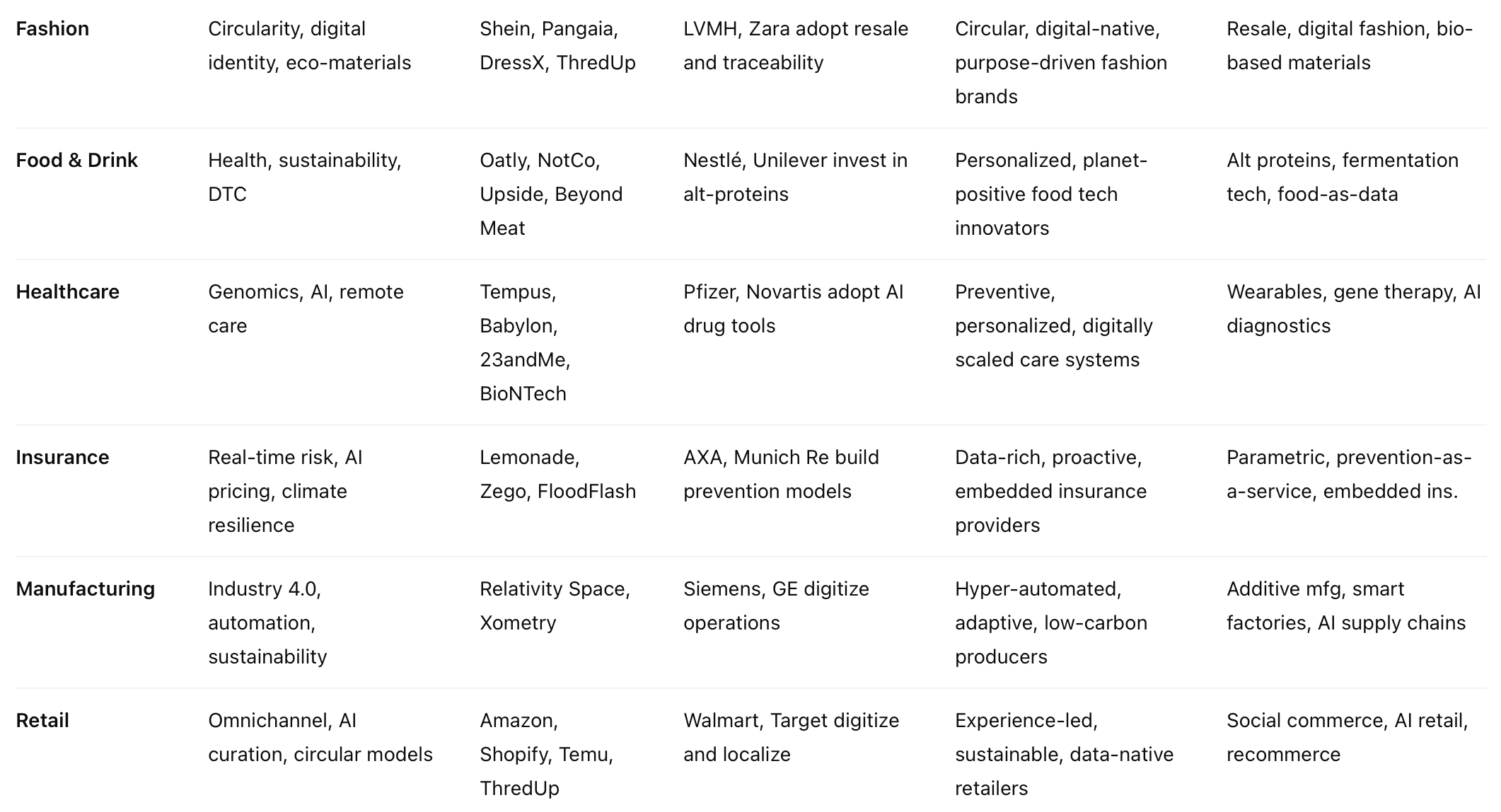The Great Reinvention … How every industry is being radically shaken up, and rapidly reinvented … Who will be the winners and losers, what will matter most, and what comes next?
March 18, 2025
Every industry is being reinvented.
A perfect storm of technological breakthroughs, shifting consumer expectations, environmental imperatives, and economic uncertainty is driving radical transformation across every sector. The boundaries between industries are blurring, value is migrating to new models and ecosystems, and the winners of tomorrow are being shaped today.
From automotive to insurance, banking to retail, energy to healthcare, established players face existential pressure to change. Legacy systems, slow-moving cultures, and risk-averse mindsets are being outpaced by fast, bold innovators—companies that use data, AI, and platform thinking to deliver better, smarter, more sustainable solutions. Tesla isn’t just a car company. Amazon isn’t just a retailer. They’re both operating systems for the future.
Disruptors are emerging from every corner of the globe—scaling faster, experimenting more aggressively, and harnessing the power of technology to solve meaningful problems.
These next generation leaders are obsessed with what’s next. They blend purpose and profit, long-term impact and short-term agility. But incumbents aren’t out of the race. The most forward-looking are reinventing themselves, acquiring new capabilities, and unlocking value from their intangible assets—brand, trust, ecosystems, and intelligence.
The next five years will be decisive. Growth will come not from doing more of the same, but from reimagining what’s possible—through smart automation, regenerative design, AI-powered personalization, and bold new business models. The winners will be those who stretch their vision, embrace uncertainty, and build for the future—not the past.
- The Reinvention Playbook: Lamborghini was a tractor company, Samsung was a grocery store
- Future Junkies: Why the best leaders are obsessed about what’s next
- What will they do next?: Anticipating the progress (and performance) of some of leading companies 2025 to 2030
- Music Reinvented: How an industry was reinvented through ecosystem thinking
- Reinventing Business with AI: the best of tech to radically reinvent organisations, and accelerategrowth
- The Net Positive Playbook. Allbirds to Climeworks, reinventing organisations for sustainable growth
- Pioneers and Transformers. Leading Airbus towards a better future, today and tomorrow
- The “Performer Transformer” Leader. Thriving in a world of relentless change

Automotive
When Lei Jun unveiled the SU7 electric supercar from his smartphone maker Xiaomi, with comparable features but over 90% cheaper than a Porsche Taycan, we knew the industry was not just being disrupted, but fundamentally reinvented. No longer just about horsepower and design, the future of cars became about software, autonomy, and energy ecosystems. Disruptors like Tesla, BYD, and Rivian are redefining mobility, while incumbents like GM and VW scramble to catch up. The future belongs to firms that can merge electric drivetrains with data-driven intelligence, build direct customer relationships, and plug into renewable grids.
- Key Drivers: EV revolution, autonomy, mobility-as-a-service
- Disruptors: Tesla, BYD, Rivian, Waymo, Nio, Xiaomi
- Incumbents: VW and Hyundai invest heavily in EVs and batteries; GM pivots toward all-electric by 2035
- Future Winners: Tesla remains dominant due to its integrated energy + mobility model; Chinese EV players like BYD are poised to lead on affordability and scale; Apple and Sony may emerge through software-first approaches
- Growth Areas: EVs, autonomous fleets, in-car software, subscription mobility
- Outlook: $5T transformation underway; platforms and ecosystems will define winners
Banking
In Brazil, David Vélez launched Nubank to free people from bureaucratic, fee-heavy traditional banks. With nothing more than a smartphone and a smile, customers signed up for accounts in minutes. Nubank now serves over 90 million users. Fintechs are rewriting the rules with embedded finance, AI risk models, and crypto rails. Traditional banks must become platforms, not fortresses. Future leaders will be those who turn trust, data, and user experience into intelligent financial ecosystems.
- Key Drivers: Fintech, AI, blockchain, real-time services
- Disruptors: Nubank, Revolut, Stripe, Square, DeFi
- Incumbents: JPMorgan and DBS investing in AI, APIs, and sustainability-linked finance
- Future Winners: Digital-first, customer-centric, embedded finance providers that turn financial services into frictionless tools
- Growth Areas: AI-enabled wealth tools, crypto custody, sustainable lending
- Outlook: Banking becomes invisible, embedded in lifestyle
Construction
Using 3D printing, Icon built a house in 24 hours using a giant robotic arm and a special concrete blend—radically reducing time, cost, and environmental impact. This illustrates the kind of breakthrough needed in a notoriously slow-moving industry. Innovation now means modular, smart, and zero-carbon construction. Giants like Skanska are investing in digital twins and low-carbon cement. Winners will combine automation, green design, and tech-savvy talent to transform how we build the future.
- Key Drivers: Green buildings, modular methods, robotics
- Disruptors: Icon (3D printing), Katerra (prefab), CarbonCure (CO2 tech)
- Incumbents: Skanska, Bouygues, Holcim, and Turner adopting digital twins and zero-carbon materials
- Future Winners: Tech-integrated construction firms that deliver faster, cleaner, cheaper buildings; smart infrastructure providers
- Growth Areas: Smart cities, digital twins, sustainable housing
- Outlook: $1T green retrofit and smart build opportunity
Energy
Octopus Energy is disrupting utilities by putting customers at the heart of a clean energy revolution—offering dynamic pricing, transparency, and rapid green energy switching. In an industry long dominated by giant incumbents, it proved agility can win. The transition to net zero, powered by solar, wind, hydrogen, and AI-managed grids, is accelerating. Winners will not just produce energy, but orchestrate energy flows, storage, and demand across intelligent, decentralised networks.
- Key Drivers: Decarbonization, decentralization, storage
- Disruptors: Tesla Energy, Octopus Energy, Vestas, Climeworks
- Incumbents: Shell, TotalEnergies, and BP redefining themselves as energy transition companies
- Future Winners: Companies that integrate solar, wind, storage, and smart grids into unified platforms
- Growth Areas: Renewables, green hydrogen, carbon capture, virtual power plants
- Outlook: Clean energy to dominate mix by 2030; trillion-dollar opportunity
Entertainment
When Roblox went public, it revealed that kids were spending more time building and playing in virtual worlds than watching TV. Entertainment is no longer passive—it’s immersive, participatory, and social. New models powered by creators, fans, and algorithms are dominating, as traditional studios play catch-up. Netflix disrupted distribution; now AI and generative content are the new frontiers. Winners will build platforms that blend content, community, and co-creation.
- Key Drivers: Streaming, gaming, AI content, creator economy
- Disruptors: Netflix, Epic Games, Roblox, TikTok
- Incumbents: Disney+ reinvention; Warner Bros. bets on streaming + IP
- Future Winners: Firms that merge entertainment, social engagement, and immersive tech; those who own IP and fan relationships
- Growth Areas: AI-generated content, gamified storytelling, AR/VR
- Outlook: Creator platforms to become dominant media forces
Fashion
Pangaia isn’t just a fashion brand—it’s a material science company using seaweed fibers and bacteria-based dyes to reinvent sustainable clothing. Fashion is being reshaped by digital identities, circular design, and transparent supply chains. Fast fashion disruptors like Shein use real-time data and micro-inventory, while luxury players are experimenting with resale and digital fashion. Future winners will merge purpose with personalization, creating garments that are smart, sustainable, and story-driven.
- Key Drivers: Sustainability, digital fashion, circularity
- Disruptors: Shein, ThredUp, Pangaia, DressX
- Incumbents: LVMH and Zara building closed-loop supply chains and digital experiences
- Future Winners: Brands that mix identity, impact, and innovation; digital-native and circular-first businesses
- Growth Areas: Resale, AI design, bio-materials, virtual clothing
- Outlook: Fashion shifts from volume to value, driven by tech + conscience
Food and Drink
At NotCo, AI named Giuseppe creates plant-based versions of animal products by analyzing molecular similarities. It made mayo, milk, and meat that taste like the real thing—but aren’t. This signals a shift toward food as software: designed, personalized, and planetary. The food revolution is being driven by sustainability, health, and technology. Giants like Nestlé are investing in alt-proteins. Winners will feed the future with science, values, and delicious innovation.
- Key Drivers: Health, sustainability, transparency
- Disruptors: Beyond Meat, Oatly, NotCo, Upside Foods
- Incumbents: Nestlé and Unilever invest in plant-based and direct-to-consumer (DTC) platforms
- Future Winners: Brands that align with planetary and personal health; those who digitize the food chain
- Growth Areas: Alt protein, fermentation tech, personalized nutrition
- Outlook: $300B alt-protein industry by 2030; data becomes the key ingredient
Healthcare
During the COVID-19 pandemic, BioNTech—once a little-known biotech firm—partnered with Pfizer to deliver a vaccine in record time using mRNA technology. It was a moonshot moment. Healthcare is being reinvented through genomics, AI, and patient-centric platforms. Startups like Tempus and Babylon offer predictive care and digital diagnoses, while incumbents digitize clinical pathways. Future leaders will move from treating illness to preventing it—personalized, predictive, and precision-driven.
- Key Drivers: AI, genomics, personalized medicine
- Disruptors: Tempus, BioNTech, 23andMe, Babylon Health
- Incumbents: Pfizer, Novartis and Roche embed AI across drug discovery and diagnostics
- Future Winners: Companies delivering preventive, digital, and personalized care at scale
- Growth Areas: AI drug discovery, wearable diagnostics, gene therapies
- Outlook: From reactive to proactive care; multi-trillion-dollar ecosystem
Insurance
Lemonade turned heads by settling some claims in under 3 seconds, using AI and behavioral economics. It proved insurance doesn’t have to be slow, opaque, or distrusted. Climate volatility and shifting lifestyles demand real-time, proactive coverage. Incumbents like Munich Re are adapting with prevention-as-a-service. The winners will anticipate, not just insure—embedding risk reduction, AI insights, and customer trust into everything.
- Key Drivers: Risk prevention, personalization, AI pricing
- Disruptors: Lemonade, Zego, FloodFlash, Trōv
- Incumbents: AXA and Munich Re building smart risk platforms and climate resilience tools
- Future Winners: Insurers who evolve into risk-reduction partners powered by real-time data
- Growth Areas: Parametric insurance, embedded models, prevention-as-a-service
- Outlook: Reinvention from safety net to proactive value provider
Manufacturing
Relativity Space is using 3D printing to make rockets—95% fewer parts, far faster iterations. It’s a symbol of manufacturing’s new age: flexible, intelligent, and software-defined. Automation, IoT, and AI are transforming everything from design to delivery. Legacy players like Siemens and GE are embracing digital twins. The factories of the future will be smart, sustainable, and continuously learning.
- Key Drivers: Industry 4.0, robotics, sustainability
- Disruptors: Relativity Space, Xometry, Vention
- Incumbents: Siemens, GE, and Bosch digitizing supply chains and factory floors
- Future Winners: Agile, hyper-automated, sustainable manufacturers with digital cores
- Growth Areas: Smart factories, additive manufacturing, nearshoring
- Outlook: $1T+ productivity gains from intelligent manufacturing
Retail
Shopify gave small businesses global reach with a few clicks—and now powers millions of storefronts. Retail is shifting from stores to ecosystems, driven by social commerce, AI curation, and instant fulfillment. Amazon, Temu, and ThredUp are reshaping expectations. Incumbents must combine digital agility with deep human insight. The next winners will create seamless, personalized, and values-based retail experiences.
- Key Drivers: Omnichannel, AI personalization, circularity
- Disruptors: Amazon, Shopify, Temu, ThredUp
- Incumbents: Walmart and Target investing in AI, last-mile, experiential retail
- Future Winners: Ecosystem retailers blending physical, digital, and sustainable offerings
- Growth Areas: Social commerce, live shopping, AI recommendation engines
- Outlook: Retail = technology; brand trust + data + delivery = competitive edge
Technology
When OpenAI released ChatGPT, it stunned the world—and ignited an AI arms race. Technology is the force multiplier of every transformation. AI, quantum, chips, and decentralised platforms are reshaping what’s possible. Disruptors like DeepMind and Anthropic push the frontiers, while incumbents like Microsoft integrate AI into everything. The winners will be ecosystem architects, building the foundations of a superintelligent, secure, and inclusive digital world.
- Key Drivers: AI, cloud, quantum, cybersecurity
- Disruptors: OpenAI, DeepMind, Anthropic, Nvidia
- Incumbents: Microsoft and Google integrating GenAI across platforms
- Future Winners: Platform-native firms owning data, chips, and AI layers
- Growth Areas: GenAI, autonomous agents, AI operating systems
- Outlook: Tech drives all other industries; $10T+ value shift imminent
Telecoms
Starlink launched satellites fast enough to beam high-speed internet to war zones and remote villages alike. It showed how agile, hardware-software integrated telecom can leapfrog legacy infrastructure. With 5G, edge computing, and AI, telecom is evolving into a platform for everything—especially B2B. The leaders will connect not just people, but machines, data, and intelligence.
- Key Drivers: 5G, private networks, AI-managed ops
- Disruptors: Starlink, Rakuten Mobile, Helium Network
- Incumbents: AT&T, BT, and Orange reposition as digital service providers
- Future Winners: Providers offering integrated connectivity, intelligence, and cloud-edge infrastructure
- Growth Areas: Satellite internet, B2B 5G, telecom-as-a-platform
- Outlook: Telcos reinvent as enablers of digital society
Travel
Airbnb changed not just where we stay—but how we experience the world. It made travel more local, personal, and flexible. Now, the rise of conscious travelers, nomadic workers, and immersive tech is redefining journeys. EcoHotels and digital nomad platforms are growing fast. Future winners will offer sustainable, seamless, and soul-nourishing travel—with data-driven personalisation and low-impact design.
- Key Drivers: Sustainable tourism, remote work, personalization
- Disruptors: Airbnb, Boom, Hopper, Nomadic, EcoHotels
- Incumbents: Marriott and Accor push eco-design, digital concierge, loyalty platforms
- Future Winners: Brands offering flexible, immersive, low-impact experiences
- Growth Areas: Bleisure (business + leisure), digital nomad services, green destinations
- Outlook: Travel reimagined around purpose, data, and experience.

Winners and losers
Of all the industries listed, technology, energy, and healthcare are likely to be transformed the most dramatically and the fastest in the next five years. However, the strategic stakes are high across all industries — and the value impact of getting it right vs wrong can mean survival vs extinction, or exponential growth vs stagnation.
Technology is the enabler of disruption across every other sector. Its pace is exponential due to AI, quantum computing, chips, and software-defined everything. Winners will become AI-native platforms, building ecosystems not just products. Losers will underestimate AI’s impact or failing to adapt legacy business models. Companies that win, like Microsoft and Nvidia, are adding hundreds of billions in market cap. Losers risk obsolescence in 3–5 years.
In energy – accelerating due to climate pressure, policy shifts, and clean tech investment – the transition from fossil fuels to renewables is reshaping everything from national security to consumer choices. Winners will be joining the shift to decentralised, customer-centric energy platforms, like Octopus Energy. Losers cling to fossil-heavy models or slow-moving asset bases. This is a $100+ trillion transition opportunity globally, where winners gain access to premium markets and long-term capital.
And in healthcare – changing rapidly due to genomics, AI diagnostics, digital therapeutics, and aging populations – the reinvention is black and white: from reactive to predictive, from generic to personalised. Winners will invest in AI, data infrastructure, and consumer-led models. Losers fail to reinvent legacy systems or ignoring preventive platforms. Personalized medicine and digital health could unlock over $3 trillion in new value globally.



Time to reinvent everything
Across every industry, reinvention is no longer optional—it’s the new normal.
Forces such as AI, climate imperatives, digital-native consumers, and global competition are disrupting traditional business models and reshaping value chains. From energy to entertainment, food to finance, every sector is being redefined by new technologies, agile entrants, and escalating stakeholder expectations. The next five years will see more industry change than the last 50 years.
Future winners won’t simply digitize what they’ve always done. They will reimagine what’s possible. They will move faster, scale smarter, and act bolder—blending innovation, purpose, and resilience into every part of their business. They will be led by visionaries who see around corners and build adaptive, AI-powered organizations that learn and evolve in real-time.
The playbook for future winners includes:
-
Adopt a platform mindset: Build ecosystems, not empires. Share data, integrate services, and create value with partners.
-
Embed intelligence everywhere: Use AI to automate, personalize, and optimize—from supply chains to customer journeys.
-
Design for impact: Prioritize sustainability, health, and wellbeing. Turn climate and social challenges into innovation opportunities.
-
Act with agility: Use modular structures, empowered teams, and rapid iteration to adapt at speed.
-
Monetize intangibles: Build brands, trust, data, and communities—not just products.
-
Think globally, execute locally: Scale ideas fast, but tailor them to people and places with cultural insight.
The companies that win will create not just better businesses, but better futures—where growth and good are inseparable. The race is on to lead, to learn, and to leap.
Explore more, with Peter Fisk:
- The Reinvention Playbook: Lamborghini was a tractor company, Samsung was a grocery store
- Future Junkies: Why the best leaders are obsessed about what’s next
- What will they do next?: Anticipating the progress (and performance) of some of leading companies 2025 to 2030
- Music Reinvented: How an industry was reinvented through ecosystem thinking
- Reinventing Business with AI: the best of tech to radically reinvent organisations, and accelerategrowth
- The Net Positive Playbook. Allbirds to Climeworks, reinventing organisations for sustainable growth
- Pioneers and Transformers. Leading Airbus towards a better future, today and tomorrow
- The “Performer Transformer” Leader. Thriving in a world of relentless change
More from the blog
